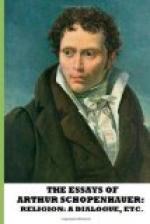most sacred treasure. If you want to form an
opinion on religion, you should always bear in mind
the character of the great multitude for which it is
destined, and form a picture to yourself of its complete
inferiority, moral and intellectual. It is incredible
how far this inferiority goes, and how perseveringly
a spark of truth will glimmer on even under the crudest
covering of monstrous fable or grotesque ceremony,
clinging indestructibly, like the odor of musk, to
everything that has once come into contact with it.
In illustration of this, consider the profound wisdom
of the Upanishads, and then look at the mad idolatry
in the India of to-day, with its pilgrimages, processions
and festivities, or at the insane and ridiculous goings-on
of the Saniassi. Still one can’t deny that
in all this insanity and nonsense there lies some obscure
purpose which accords with, or is a reflection of
the profound wisdom I mentioned. But for the
brute multitude, it had to be dressed up in this form.
In such a contrast as this we have the two poles of
humanity, the wisdom of the individual and the bestiality
of the many, both of which find their point of contact
in the moral sphere. That saying from the Kurral
must occur to everybody.
Base people look like men,
but I have never seen their exact counterpart.
The man of education may, all the same, interpret
religion to himself
cum grano salis; the man
of learning, the contemplative spirit may secretly
exchange it for a philosophy. But here again
one philosophy wouldn’t suit everybody; by the
laws of affinity every system would draw to itself
that public to whose education and capacities it was
most suited. So there is always an inferior metaphysical
system of the schools for the educated multitude,
and a higher one for the
elite. Kant’s
lofty doctrine, for instance, had to be degraded to
the level of the schools and ruined by such men as
Fries, Krug and Salat. In short, here, if anywhere,
Goethe’s maxim is true,
One does not suit
all. Pure faith in revelation and pure metaphysics
are for the two extremes, and for the intermediate
steps mutual modifications of both in innumerable
combinations and gradations. And this is rendered
necessary by the immeasurable differences which nature
and education have placed between man and man.
Philalethes. The view you take reminds
me seriously of the mysteries of the ancients, which
you mentioned just now. Their fundamental purpose
seems to have been to remedy the evil arising from
the differences of intellectual capacity and education.
The plan was, out of the great multitude utterly impervious
to unveiled truth, to select certain persons who might
have it revealed to them up to a given point; out of
these, again, to choose others to whom more would be
revealed, as being able to grasp more; and so on up
to the Epopts. These grades correspond to the
little, greater and greatest mysteries. The arrangement
was founded on a correct estimate of the intellectual
inequality of mankind.




